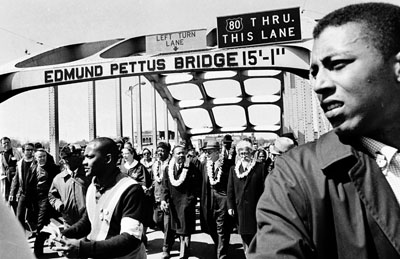Classic Jewish joke. Two Jewish men are walking late at night in a dangerous neighborhood. They hear footsteps behind them. One says to the other: “We’d better be careful. There are two of them, and we’re alone.”
In the wake of the Black Lives Matter pronouncements on Israel, many Jews have felt alone.
How redemptive, therefore, to learn that an association of hundreds of predominantly African-American churches in St. Louis condemned that recent platform.
Bishop Lawrence Wooten said that while Black Lives Matter plays a “vital role” in addressing racial violence by police, its language on Israel was misplaced.
The Ecumenical Leadership Council of Missouri, representing hundreds of predominantly African-American churches throughout the state, rejects without hesitation any notion or assertion that Israel operates as an apartheid country. We embrace our Jewish brethren in America and respect Israel as a Jewish state. Jewish-Americans have worked with African-Americans during the civil rights era when others refused us service at the counter — and worse.
Wooten also referred to two American Jews — Michael Schwerner and Andrew Goodman — who along with James Chaney, a young black man, were murdered in 1964 while doing civil rights work in Mississippi.
It is no accident that this statement of support came from black religious leaders in St. Louis — in the shadow of Ferguson, Missouri.
In 2014, Jewish leaders and black leaders marched together in Ferguson to protest the death of Michael Brown, an unarmed 18-year-old who was shot to death by a police officer.
From this, we learn a powerful lesson.
Yes, there is anti-Israel feeling among some black groups.
But, while such hateful ideology exists, it doesn’t have to surface.
Sometimes, all it takes to strengthen the immune system against hate is something as simple as relationships.
I would like to think that this is what happened in St. Louis. The Jews were there for the blacks, and they reciprocated.
So, thank you.
All of which gets me thinking: what else have American blacks given American Jews?
Their renewed sense of Jewish identity.
Go back in time, to the 1960s, when the civil rights movement was just getting started.
Yes, Jewish leaders helped the civil rights movement (those stories are etched into Jewish minds and souls like a catechism).
But, in fact, it was the civil rights movement that gave American Jews the courage — to be themselves as American Jews.
American blacks were the first ethnic group to actually question and protest the dominant WASP identity of America.
Ethnicity in America only became “fashionable” once American blacks showed that it was both possible and desirable to stand apart from the “Leave it To Beaver” world of bland, generic middle class life.
Or, to put it this way: American Jews became “tribal” (with all of the good and not-so-good connotations of that term) only after black Americans showed that it was “acceptable” to be a tribe.
Consider: Jerry Kirschen, a Jewish cartoonist of the late 1960s. His cartoons, which often appeared in radical newspapers, often bewailed the fact that, compared to black radicals, young American Jews were so lukewarm on their own identity.
Jerry wasn’t kidding around; in the early 1970s, he made aliyah, changed his name to Yaakov — and created the popular “Dry Bones” political cartoon, which has appeared in the Jerusalem Post since 1973.
Or, consider: today, any Jewish student, at almost any university, can take a Jewish studies course — and, in many places, can even major in Jewish studies.
Back into the time machine, please.
Before the mid 1960s, there were very few Jewish studies courses at American secular universities. Those courses emerged at approximately the same time as African-American studies became a reality.
In fact, Julius Lester is perhaps the only academic to have taught in both the African-American studies program and the Jewish studies program at the University of Massachusetts, Amherst.
You will retort that Jews are still white (except for those who aren’t) (and you need to read Eric Goldstein’s book on how Jews, in fact, actually came to be considered as white in America).
You will retort that Jews never, ever, suffered anywhere near as much as African-Americans have suffered.
And you would be right. You can count on the fingers of both hands the number of American Jews who were murdered for being Jewish.
But, both blacks and Jews worked together on an important project — that might have had even more lasting value than civil rights marches.
Blacks and Jews, together, challenged the ethnic and cultural status quo in America. The cross-pollination between black culture and Jewish culture is a deep, powerful, complex, and nuanced story.
And we need to tell that story, because it is a quintessentially American story.
Meanwhile, to all of the African-American churches in St. Louis that stood up to the anti-Israel forces in the Black Lives Matter movement — thank you.
May we always have the holy privilege of marching together.






